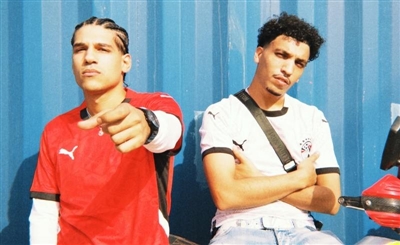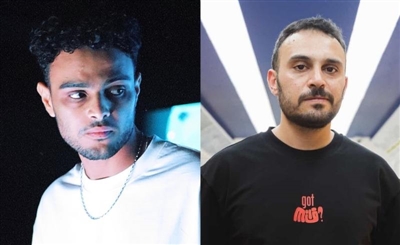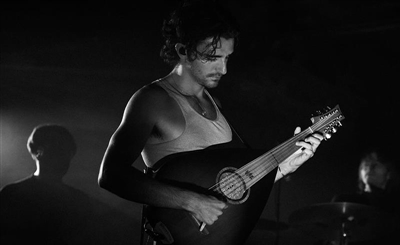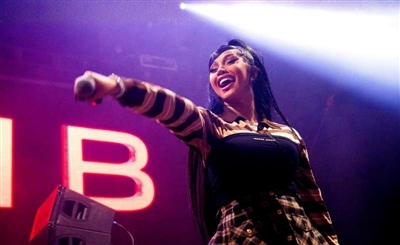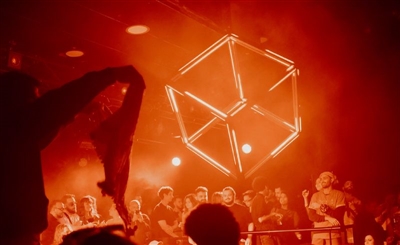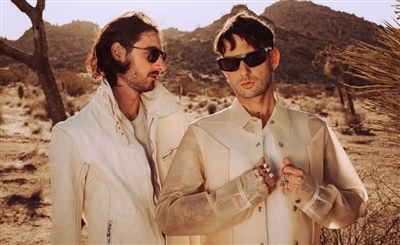Saudi Pop Star Mishaal Tamer on Breaking Ouds & Glass Ceilings
In this XP Artist Spotlight, we caught up with Mishaal Tamer while he was on tour in Europe to hear all about his beginnings, his inspirations, and how he broke an oud to find his sound.
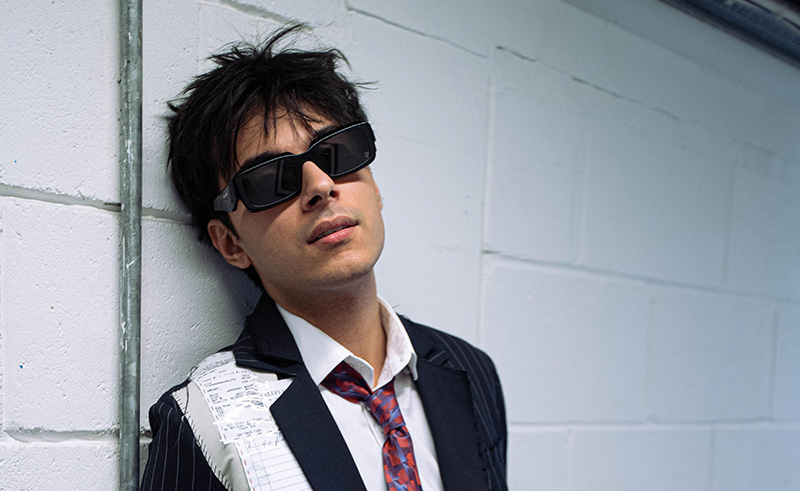
From a nine-year-old Saudi boy plucking at his guitar, to an S-pop star embarking on his first European tour at 22 years old, artist Mishaal Tamer is out to tell the story of his generation through the power of art. Tamer does not intend to force Saudi heritage into his music, according to him, there will be no kabsa reference. He’s telling his story, the story of a young generation of Saudis, a generation that happens to like rock and pop, not necessarily oud.
On the road to Rosenheim, Germany, on his way to perform as OneRepublic’s opening act, Tamer connected with SceneNoise over Zoom, while his mother sat in the backseat of the car while his father showed his support by driving him to the concert, which Tamer calls “such an Arab thing” to do. Despite the support of his parents and his cousins, who cheer him on at every gig, Tamer was born and raised in Saudi Arabia during a time when his love for rock music was considered unseemly, if not taboo.
In 2020 Tamer became the first Saudi artist to sign a major record deal in the US with RCA Records, before releasing his debut EP ‘Life’s a Ride’ with pop sounds and a heartfelt personal narrative. However, being the first Saudi artist to achieve this milestone is not Mishaal's ultimate aim, the rising artist is more adamant about paving the way for others to follow suit.
During our Zoom call, Tamer told SceneNoise all about how he found his voice, the pains and triumphs of navigating, his identity locally and globally, and how a broken oud inspired a whole new sound.
-d68cb181-ed9e-43a5-b714-eed4c7945d03.jpg)
What has been your favourite city or performance so far?
My favourite was definitely London. Whenever I performed there, especially with songs like ‘Walahy’, I could feel a strong connection with the audience. It was my first show outside of Saudi Arabia, and it was also the first time I openly stated that I am from Saudi on stage. You see, our country is going through changes, and we are trying to overcome certain stigmas. Some people advised me not to reveal my Saudi identity, but I felt differently.
During the performance, a technical malfunction occurred, causing the band to leave the stage briefly. I thought if I had left too, it would have been disappointing for the audience. So, I decided to sit down in the middle of the stage and take the opportunity to share a bit about myself. At that moment, it just slipped out, and I proudly said, “I'm Mishaal Tamer, and I'm from Saudi Arabia.” There was a brief silence, but then someone cheered, and the whole audience joined in. It was an incredible experience, especially since that was after they had heard my music. Music truly has the power to connect people and bring them together.
You don't have to visit a country to enjoy its music or experience the creativity of its youth. After that show, people were telling me that they want to go to Saudi Arabia. Music has the ability to change perceptions, especially when it's authentic and reflects genuine emotions – that's what makes it so beautiful and human.
I am grateful for the opportunity to show the world what a Saudi Arabian guy like me can look and sound like. Our identity is not just tied to oil or stereotypes, and it's essential for people to see and understand that.
How do you sort of navigate the stigma in Saudi, while also the stereotype ascribed to you on a global scale?
When I was growing up, becoming a musician seemed impossible and even taboo. For example in Saudi Arabia, many children have Quran teachers, and my peers would often tell me that playing the guitar was considered haram (forbidden), but times are changing, and I believe it's essential to break free from these limitations.
Although there is still resistance from the older generation, particularly towards events like MDLBeast and music in general, I stay true to myself. My music is not about explicit or offensive content; it's about sharing my life experiences and emotions. I believe there's nothing wrong with expressing myself through music, and I aim to be motivational with my songs because the music was my way out of tough times. This message is universal, and I believe it's what resonates with people worldwide, and I feel like local artists are sometimes forced into a box or an ‘exotic’ heritage-inspired sound.
How so, can you share more about this?
I've noticed that many people from my home country often feel obliged to force ‘exotic’ elements from our culture, as if they're trying to impress someone or make them happy. For me, music serves a different purpose – it's a means to express myself genuinely. While I do draw inspiration from the heritage music of my homeland, I've observed that in the Arab diaspora, they often feel the need to incorporate traditional Arab instruments. However, in Saudi Arabia, we don't particularly resonate with that style of music.-e4c3561c-ae9c-4818-af65-c362dd400c40.jpg)
Why do you think this shift away from traditional music exists in Saudi?
The younger generation is trying to distance themselves from the older generation's perspective, this double standard that "music is haram", but they accept it when traditional instruments like the oud are played. Back home, people love rock music and that kind of vibe. When I was in New York, I decided to get an oud for myself and incorporate it into my music in a way that suits my taste.
I bought the cheapest oud I could find and then modified it by breaking it from behind and connecting it to a microphone. I treated it like an electric guitar, and it took me a couple of weeks to figure out the right setup. Several tests later, I tuned it up and used plugins that I usually incorporate, and that's when I realised how incredible it sounded.
The oud's hypnotic tonality is something that a guitar could never replicate. Its richness and heaviness added a whole new dimension to my music. This experimentation led to the creation of one of my favourite sounds ever, something I like to call ‘Broken-Electric Oud’ or ‘Rock Oud’. It's the main sound in my song 'Disco Cowboy'.
As a Gen Z Saudi artist, how do you view the current musical landscapes and its possibilities?
I believe this kind of innovation is the beauty of our culture's art. I encourage more kids in Saudi to experiment, as this is the perfect time to do so. You don't have to awkwardly add traditional elements like tabla to your music; it's a blank page for artists in our country to innovate, create their own genres, and even break their ouds in the process.
Your introduction to music was bittersweet, to say the least, how has your perspective on your injury shift through learning music?
This 32-stitch scar is from when I was nine years old, and I broke my arm. I also have nerve damage in my hands and fingers. If it wasn't for a Lebanese doctor, who was ironically trained in Germany (which is one of my biggest listener fan bases on Spotify), he saved my arm and recommended playing the guitar, which ended up saving my hands and fingers. It was like physiotherapy, and without it, I wouldn't be able to hold my phone now and speak to you. I wouldn't be able to hold the guitar or perform on stage, ultimately changing my life. A year later, I started writing music, and since then, I've been doing it every day.
When did you start finding success in music? Was there a specific song that you feel resonated most with audiences?
You know, it's like when you're a kid and you're growing taller without even realising it. That's exactly how it felt. I don't believe in a ‘lottery ticket’ kind of situation where success just magically happens. Instead, we have to keep going. And I'm just trying to keep going.
Then, in 2017, something remarkable happened – Saudi Arabia opened up, and music became fully legalised. That same year I created an Instagram account and posted a 10-second clip titled 'Can't Love Myself'. It's still unbelievable that this happened. People started making loops of it on YouTube, and Lofi producers began using it in their study beats. So I thought, why not post another one?
A fascinating connection emerged because many of these producers were also gamers, just like me. Interestingly, not many people shared the name Mishaal Tamer, so they recognized me easily. We recorded music using the Xbox mic, and this led to the creation of songs like 'Addicted' and 'Tell Me About You.' The whole experience was incredible and unexpected.
Who were your musical influences growing up?
A lot of Michael Jackson's music, and, of course, OneRepublic too. Interestingly, the first music video I ever saw was OneRepublic's ‘Apologize’, specifically the Timbaland remix version.
And now, coincidentally, Timbaland himself listened to my song ‘Disco Cowboy’ and is working on a remix of it, which feels surreal to me. The fact that someone I admired from my early days is now involved in my music is simply mind-blowing.
How does your Saudi/Ecuadorian identity play into your music?
The songs I create incorporate a blend of Arabic and Spanish words, and in the future, I would love to collaborate with more Spanish artists. The Latin market is one of the largest for music, and it just feels right for me to showcase my Saudi identity and share my country with the world. I'm actively working on bridging that gap between cultures through my music. If I hadn't been from Saudi Arabia, the concept of the broken electric guitar-oud might not have come into existence, and I'm grateful that it does exist now. So yeah Saudi definitely pops up in my music, it’s who I am.
How did songwriting and creating music help you deal with your personal grievances? Any memorable instances you’d like to share?
Obviously, like a lot of us during quarantine, I got really depressed, and I hit rock bottom, honestly. I went to the States and spent most of the quarantine there. I felt like I hated myself during that time. Over those two years, I ended up making 800 songs – it was all I did. However, I wasn't releasing much music, except for features, due to my label. I wasn't in a good place mentally.
Among those 800 songs is ‘Disco Cowboy’, and it will be part of my upcoming album titled 'Home is Changing'. This album revolves around the story of those two challenging years and how I managed to get out of that dark place. If you listen to the album, you'll basically be inside my head during that time.
Is ‘Home is Changing’ a reference to Saudi Arabia’s cultural shift, or your personal journey?
It's definitely both about my homeland’s development, and this new voice of Saudi artists and musicians, and about my growth as a person. Being 23 years old, the past couple of years have been transformative to me as a person and as a musician so it’s definitely about both.
Why ‘Disco Cowboy’?
The reason is that I became the Disco Cowboy when I went to America; I lost myself in the process. The song is all about that feeling of being lost and alone, which is where the story begins. Interestingly, the words ‘Disco Cowboy’ aren't actually in the song, but the essence of the persona and experience is reflected throughout.
Tell us about your debut concert in Saudi & MDLBEAST, did you expect this turnout?
That was my very first performance ever. Before going on stage, just to let you know, I'm actually very shy and introverted. My mom even asked me if I was sure about doing this, but to be honest, I wasn't entirely sure myself. I get shy even in ‘ezoumas’, for God's sake.
However, that day turned out to be one of the best days of my life. The moment I stepped onto the stage, I felt an incredible sense of freedom. It was like a weight had lifted off my shoulders. When I looked at the audience and heard them screaming my name, it felt as if I was looking at myself. They already knew everything about me, and it felt like I was singing in the shower – it was the highest form of freedom and self-expression.
How has social media impacted your music career?
I think I'm one of those artists who believes TikTok is definitely one of the best platforms for artists. However, for me, it wasn't TikTok that made the initial impact; it was actually Discord. This platform connected me with producers and a wider community, which was invaluable. Being an artist today, you have to embrace social media. It's an incredible way to interact and inspire people.
When fans reach out to me, I often encourage them to write a song about their experiences. I feel like inspiring others to create music, especially artists from back home is my calling. I don't want to be the only one; I want to open doors and pave the way for more musicians. In today's world, social media plays a significant role, and you can record music with just about anything. Anyone can release music now, and I genuinely believe they should. For the longest time, I remained relatively unknown on social media, just releasing music without revealing my face.
How do you feel about being one of the first Saudi artists to sign with a global record label (RCA Records)?
It was great in getting me a visa honestly, it’s one of the things that Arab artists have to consider sadly enough. But yeah being the first doesn't really register or matter to me, it’s about unlocking possibilities for me and similar artists from different backgrounds.
Tell us about your songwriting process.
It kind of happens anywhere – in the shower, the car, or even at a restaurant. I take a lot of voice recordings, and if you see me in public, you'll probably catch me quickly recording to remember an idea. Most of the time, I write the lyrics right before recording so I can stay in the right headspace. When I record, it doesn't feel right unless I feel less heavy or experience a release of emotions. It's not about singing perfectly in tune; what matters most is singing from your soul, from the depths of your being.
-94dba454-c9b7-4e12-82bc-e79a266f55b0.jpg) You have a very dedicated fanbase, the ‘Chicken Gang’, tell us about this community and your interactions with them.
You have a very dedicated fanbase, the ‘Chicken Gang’, tell us about this community and your interactions with them.
One of my management team members, Musab, was initially a fan, and we eventually hired him because of his incredible support. Another fan recently made me a hoodie, beautifully stitched with references from my songs, and I can't wait to wear it at my next show. This is the power of social media. Without it, I wouldn't have received such a thoughtful gift, and I wouldn't have had the chance to meet Musab.
My fanbase is truly amazing; they are always there for each other. If someone on Discord is going through a rough time, everyone goes out of their way to offer support. It's truly heartwarming to witness how my music brings them together and creates such a strong sense of community. The way music unites people is unlike anything else.
You're making your acting debut soon in Saudi filmmaker Ahd Kamel’s ‘My Driver and I’, tell us about your role and this experience.
The film is directed, produced and shot by three women and it’s the first Saudi film to represent that. The story is also very special. It’s set in 1980s Saudi, and the protagonist is a young rebellious girl ‘Salma’ who drives although legally she’s not allowed to. And I love that. I play the role of a musician also and I play the guitar, and I think telling this story and seeing artists through the lens of this historical period is essential.



